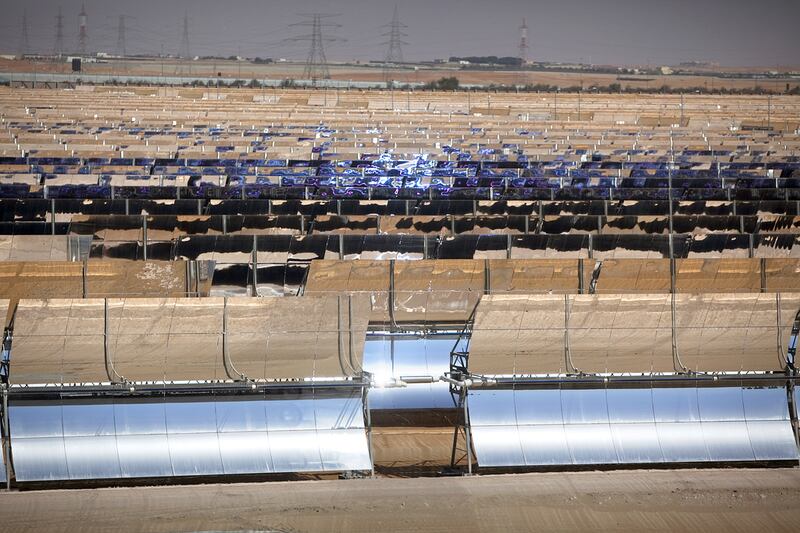Power plant builders seeking a share of the Middle East's US$50 billion solar energy market risk paying higher financing charges as the region diversifies from oil.
"The interest margin would be higher" for privately built solar plants than for conventional, natural gas-fired units, said Richard Keenan, an energy finance attorney at the law firm Chadbourne & Parke in Dubai. Projects will need to begin generating revenue before their operators try to tap bond markets because investors generally require a steady cash flow, he said.
Saudi Arabia, the biggest producer in Opec, and the UAE plan to solicit bids this year for as much as 1,000 megawatts of new solar capacity to reduce reliance on fossil fuels for domestic power production. Abu Dhabi's renewable energy company Masdar, along with Total and Abengoa, borrowed about US$600 million from 10 banks in March 2011 to build the Arabian Gulf's first large-scale solar plant. They did not disclose the interest rate for the 100MW facility, which started operating last March.
Builders of gas-fed plants can borrow “in the range of 150-250 basis points over Libor”, or the London interbank offered rate, said Ed James, the head of the project finance researcher Meed Insight. Regional lenders might “ask for a slightly higher margin” for solar units, he said. Abu Dhabi National Energy, the state-run utility known as Taqa, and partners agreed to pay 260 basis points more than Libor on a 2009 loan to build a gas-fired facility.
The Middle East and North Africa will need more than $50 billion in investments by the end of the decade to add as much as 15,000MW of solar-generating capacity, the Middle East Solar Industry Association and Meed Insight said in a report last month. Fourteen countries in the region have a combined capacity to produce 260,000MW from all energy sources, including 271MW of solar, according to the report.
“Funding for such projects will come from groups of international banks that offer renewable financing experience with regional banks providing local knowledge and liquidity,” Roberto de Diego Arozamena, the chief executive of the Saudi holding company Abdul Latif Jameel said last month.
As banks become more comfortable financing solar projects in the region, borrowing costs will probably align more closely with those for conventional plants, Mr Arozamena said. Jeddah-based Jameel last month announced a joint venture to pursue renewables business in markets including Saudi Arabia.
First Solar, the largest US solar panel manufacturer and builder of Dubai’s first sun-powered plant, paid 225 basis points more than Libor for a $450m five-year revolving credit line in July, according to data compiled by Bloomberg. Taqa’s venture agreed to pay its higher margin of 260 basis points four years earlier, in the midst of the global financial crisis. The venture, Ruwais Power, refinanced with $825m in bonds last year.
Markets such as the US that have more experience in solar and wind power contributed to last year’s record of almost $14bn in worldwide sales of bonds for renewable energy projects, double the previous peak in 2010, according to Bloomberg New Energy Finance. The so-called green bonds included $1bn in securities issued by a subsidiary of Warren Buffett-controlled Berkshire Hathaway’s Mid-American Energy Holdings.
The issuer, MidAmerican Solar, obtained funding for 22 years at a cost of 5.375 per cent. That compares with the 6 per cent yield that Ruwais Power, the Taqa partnership that refinanced last year, paid for its bonds due in 2036.
Jordan, Morocco and Egypt, Mena countries that are not Opec members, also want to generate power from the sun and wind to cut their dependence on costly imported fuel.
Any expansion of the Middle East’s renewables industry will depend on regional governments following through on plans they announce. Developers have been waiting since last year for Saudi Arabia’s solar tenders and still do not have a clear idea of when in 2014 they will be able to bid, said Jameel’s Mr Arozamena.
The Saudi government could pay with its own funds for construction companies to build some of the planned solar facilities and then operate them itself instead of seeking private developers to build as well as run them, he said.
For such private companies, getting loans will depend partly on their ability to persuade lenders that state-run utilities will pay enough for electricity to make the ventures profitable over the long term, said Laurent Longuet, Middle East managing director of Total’s US-based solar subsidiary SunPower Corp.
“What’s important for banks when evaluating renewable energy projects is to be able to manage their risk,” Mr Longuet said last month in Abu Dhabi. “Banks are looking to finance projects where there are the best guarantees, and, here in the Middle East, that’s provided by the power buyers, which are mainly the governments.”





